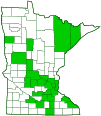impressive meloine beetle
(Meloe impressus)
Conservation • Description • Habitat • Ecology • Distribution • Taxonomy
|
|
|||||||||||||
Description |
Impressive meloine beetle is an elongated, medium-sized, blister beetle, ½″ to 1″ in length. Males are smaller than females. The head, body, and legs are usually brilliant metallic blue, violet, or green, sometimes black. The head is more or less rectangular when viewed from above. It is 70% to 80% as long as wide and is abruptly constricted behind the eyes forming a short neck. It is sparsely covered with scattered, fine pits. The upper margin of the eye is nearly straight. The antennae are bead-like and have 11 rounded segments. On males, the antennae are bent in the middle with segments 5, 6, and 7 forming a C-shaped kink. Segment 5 is enlarged and flared outward at the end. The thorax is narrower than the head and abdomen. The upper plate covering the thorax (pronotum) has straight sides that converge toward the rear (posteriorly). It is sparsely covered with scattered, fine pits. The abdomen is oval-shaped. There are no hindwings. The hardened forewings (elytra) are small, much shorter than the abdomen, and overlap at the base. The legs are long and slender. The femur of the front leg does not have a patch of hair. A outer spur at the end of the fourth leg segment (tibia) of the hind leg projects toward the rear. |
Size |
Total length: ½″ to 1″ |
Similar Species |
Habitat |
August to October |
Ecology |
Season |
|
Behavior |
They are found on the ground or on low foliage. When threatened or mishandled blister beetles (family Meloidae) exude a yellowish liquid from their joints. The thick oily substance contains the toxin cantharidin, which causes blistering on human skin. |
Life Cycle |
The female deposits eggs on foliage or in a 1″ deep burrow in the ground. After the eggs hatch the larvae pass through four stages. The first stage (triungulin) is mobile on plants. The entire hatched group climbs to the top of a plant and forms a cluster in roughly the shape of a female ground bee. It then exudes a chemical scent that mimics the pheromone of a female bee. When a male bee attempts to mate with the mass, some of the larvae attach themselves to its hairs. When the male mates with a female bee some of the larvae attach to the female. These remain on the female while she builds a nest, then detach and begin feeding on newly laid bee eggs. The second stage of this larva is a short-legged grub, called “first grub”, that spans four molts (instars). This stage feeds on honey in the nest. The third stage/sixth instar, called coarctate, is legless and immobile. The larva usually overwinters in this stage is a state of low metabolic activity (diapause), though it may overwinter in other stages. The fourth stage/seventh instar, called “second grub”, is a nonfeeding form that resembles the first grub. This stage feeds on honey and stored pollen. it is soon followed by the pupal stage. Favorable environmental conditions may cause the larva to skip the coarctate stage. Adverse conditions may cause it to molt from the second grub back to the first grub, delaying the pupal stage until conditions improve. |
Larva Food |
Bee eggs and stored food in ground-nesting bee nests. |
Adult Food |
Plant foliage and flowers of many plants, including field mustard, hepatica, spotted touch-me-not, tall buttercup, bristly buttercup, Irish potato, virgin’s bower, and eastern white pine. |
Distribution |
||
|
Sources The bionomics of blister beetles of the genus Meloe and a classification of the New World species [by] John D. Pinto and Richard B. Selander. Pinto, John D.; Selander, Richard Brent, 1927. joint author. University of Illinois Press 1970 |
|
| 4/18/2025 | ||
Occurrence |
||
|
||
Taxonomy |
|
Order |
Coleoptera (Beetles) |
Suborder |
Polyphaga (Water, Rove, Scarab, Long-horned, Leaf, and Snout Beetles) |
Infraorder |
Cucujiformia |
Superfamily |
Tenebrionoidea (darkling beetles and allies) |
Family |
Meloidae (blister beetles) |
Subfamily |
Meloinae |
Tribe |
Meloini |
Genus |
Meloe (oil beetles) |
Subgenus |
Meloe |
Subordinate Taxa |
|
|
|
Synonyms |
|
|
|
Common Names |
|
impressive meloine beetle |
|
Glossary
Diapause
A period of decreased metabolic activity and suspended development.
Elytra
The hardened or leathery forewings of beetles used to protect the fragile hindwings, which are used for flying. Singular: elytron.
Femur
On insects and arachnids, the third, largest, most robust segment of the leg, coming immediately before the tibia. On humans, the thigh bone.
Instar
The developmental stage of arthropods between each molt; in insects, the developmental stage of the larvae or nymph.
Pronotum
The exoskeletal plate on the upper side of the first segment of the thorax of an insect.
Tibia
The fourth segment of an insect leg, after the femur and before the tarsus (foot). The fifth segment of a spider leg or palp. Plural: tibiae.
Visitor Photos |
||
Share your photo of this insect. |
||
This button not working for you? |
||
Dan W. Andree |
||
Oil Beetle... I filmed and photographed this interesting creature. It has really elaborate antennae and you can see previous chewed off flower petal areas. They seem to really like Pasque flowers. It was kind a shy compared to the poison ivy sawfly that just paid no attention to me. This oil beetle would stop eating sometimes be under a flower petal and seemed to be most active if the sun was on it. Probably because it wasn’t that warm out and a NW breeze made it feel cooler when the sun went under a cloud or if my shadow shaded it. Funny little creature. |
||
Save The Goldens |
 |
Scott Fluegel |
||
there three or four. I made an observation on iNaturalist. |
||
 |
||
Jackson Stai age 7 |
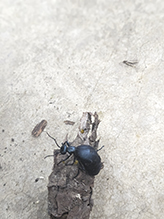 |
Mike R. |
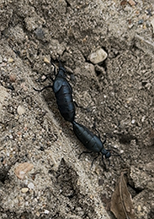 |
Have sighted several over the last three days. |
BG |
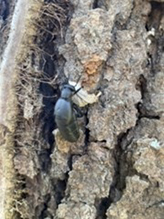 |
Ashlee B. |
||
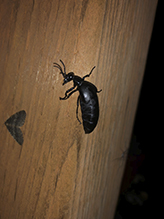 |
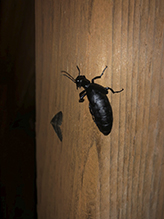 |
|
| Found at 9:10pm in the outskirts of town. |
|
|
Kim W. |
||
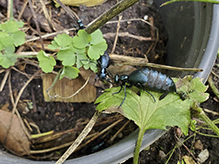 |
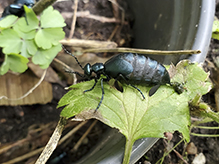 |
|
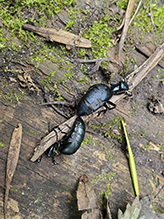 |
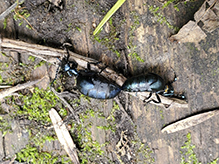 |
|
Sara Brice |
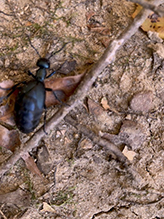 |
Allen Guggisberg |
||
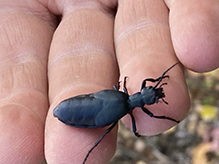 |
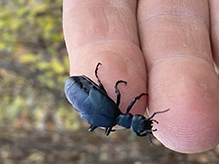 |
|
Kirk Nelson |
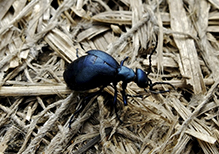 |
Denny |
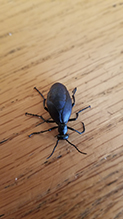 |
| Near Otter Lake |
Holly Clark |
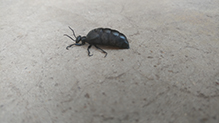 |
| Eden Valley |
Nikota |
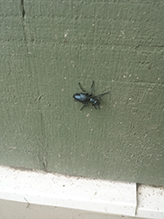 |
L |
||
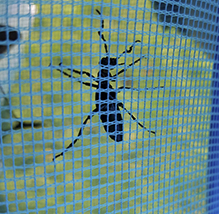 |
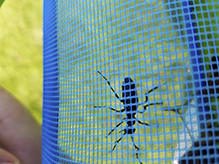 |
|
Michael Tuma |
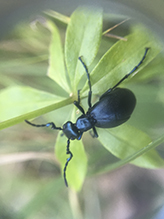 |
Mary Beth Townley |
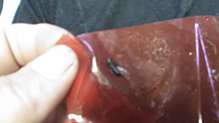 |
MinnesotaSeasons.com Photos |
||
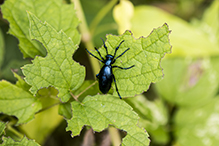 |
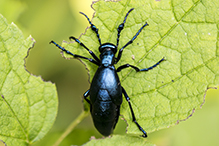 |
|
Male |
Male |
|
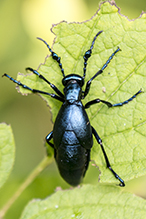
|
||
| Male |
|
|
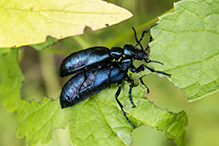 |
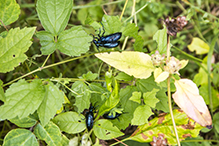 |
|
Male and female |
Male and female |

Slideshows |
|

Visitor Videos |
||
Share your video of this insect. |
||
This button not working for you? |
||
Sara Brice |
oil beetle impressus 01 |
About
oil beetle (Meloe impressus) |
Other Videos |
||
Wild Life Skills #9 - Oil beetles |
About
Uploaded on May 3, 2011 Nick Baker gets up close to one of the UK's most incredible insects - the oil beetle. Big, black and shiny with an amazing lifecycle, Nick's film will help you to discover more about these unusual animals plus you can find out more onour website: www.wildlifewatch.org.uk/oil-beetles |
Awesome Detailed Macro Video Of An Oil Beetle On My Hand |
About
Published on Mar 21, 2014 We have Oil Beetles in our Wiltshire Garden. Oil Beetles are reliant on solitary bees for their survival. Due to the destruction of the countryside ( by many different factors ) there has been a decline in the solitary bees. Thus the oil beetles are now declining rapidly. TAKE CARE OF THEM, OIL BEETLES ARE LISTED AS PRIORITY SPECIES FOR CONSERVATION. Video & Music by Samantha Wimblett Pictures & Video using a Lumix FZ200 bridge camera |

Visitor Sightings |
||
Report a sighting of this insect. |
||
This button not working for you? |
||
Save The Goldens |
Location: Coon Rapids Dam Regional Park |
 |
Scott Fluegel |
Location: Myre-Big Island State Park, Big Island there three or four. I made an observation on iNaturalist. |
 |
| Jackson Stai age 7 9/5/2023 |
Location: 24651 Edenvale Trail, Elko New Market MN 55020 |
 |
| Mike R. 5/12/2013 |
Location: Fogard Lake (Otter Tail County), MN Have sighted several over the last three days. |
 |
| BG 4/14/2022 |
Location: Columbus, IN |
 |
| Ashlee B. 12/5/2021 |
Location: Cottage Grove, Oregon Found at 9:10pm in the outskirts of town. |
 |
| Kim W. 9/8/2021 |
Location: Kaplan's Woods Owatonna, MN |
 |
| Sara Brice 10/15/2020 |
Location: Kaplan's Woods Owatonna, MN |
 |
| Allen Guggisberg 10/9/2020 |
Location: Ely, MN, St. Louis Co. Found this one near Bearhead Lake State Park |
 |
| Kirk Nelson 9/19/2020 |
Location: Whitetail Woods Regional Park |
 |
| Denny 9/3/2020 |
Location: Lino Lakes, Mn Near Otter Lake |
 |
| Holly Clark 4/27/2019 |
Location: Meeker County Eden Valley |
 |
| Nikota 8/16/2018 |
Location: Henderson Township, Sibley County, MN |
 |
| L 9/2/2017 |
Location: Big Lake, Sherburne County |
 |
| Michael Tuma 8/15/2017 |
Location: Miesville Ravine Park Reserve, Miesville, MN |
 |
MinnesotaSeasons.com Sightings |
||

|
Created: 8/17/2016 Last Updated: © MinnesotaSeasons.com. All rights reserved. |
